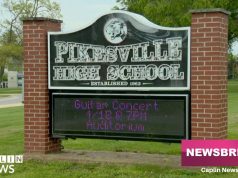Writing has been a part of the healing process for many school shooting survivors, including those from Marjory Stoneman Douglas High School, who talked about the power of words during an event Feb. 13 in Coconut Creek.
Students and teachers shared their experiences at the South Florida book launch of “If I Don’t Make It, I Love You.” The event took place at the North Regional/Broward College Library on the eve of the second anniversary of the Parkland shooting that killed 17 people.
“For me, it’s writing, but it could be sculpting, painting, music; the arts can really help the healing process,” said Dara Hass, an English teacher at MSD who had three students killed and two injured in her classroom during the Feb. 14, 2018 tragedy. “Having a voice, whether it’s an actual voice in writing words or a voice in pictures, really helps.”
She read an account of her experience, struggling to hold back tears as she got to the part when, waiting with her students for the shooter to leave, she texted “I love you” to her mom and husband.
Survivors from different school shootings, as well as family members, friends and community leaders, shared their stories in the book, a collection of more than 60 poems and other pieces of writing.
The event also included book readings by Rachel Bean, a 2017 graduate of MSD who found out about the shooting as a college student at the University of Central Florida, and Harold Ng, who survived being shot in the back of the head while at Northern Illinois University in 2008.
Bean wrote a piece on how the shooting affected her from a distance while Ng wrote a letter to the MSD students.
A panel discussion followed the readings. Laura McDermott, an English professor at Broward College and organizer of the event, moderated the panel of six that included: the three writers; Amye Archer, one of the editors of the book; Arlene Gordon, director of Brief Therapy Institute at Nova Southeastern University and Deborah Eve Grayson, a poetry therapist and expressive arts specialist.
The discussion focused on the effect that expressing feelings through art has on victims of trauma, whether they lived through a tragedy firsthand or dealt with it from a distance.
“Art goes straight to the heart of the matter and often bypasses the intellect and just gets to the soul,” said Grayson, adding that it is important for people to express their feelings however they can.
Morgan Zimmer, a Broward College student who attended the event, was a friend of Parkland victim Meadow Pollack. She asked the writers how they walked into public places after the tragedy, because she, to this day, finds it difficult to, “go to Publix and buy chicken.”
Hass said that Zimmer’s experience was understandable and that, while going to public places didn’t get easy, she became more able to handle the situation by accepting her grief.
“I would like people to know that it is okay to grieve over something so tragic,” said Zimmer. “It’s okay to be yourself for a couple of months or however long it takes, but it’s okay, life moves on.”
































